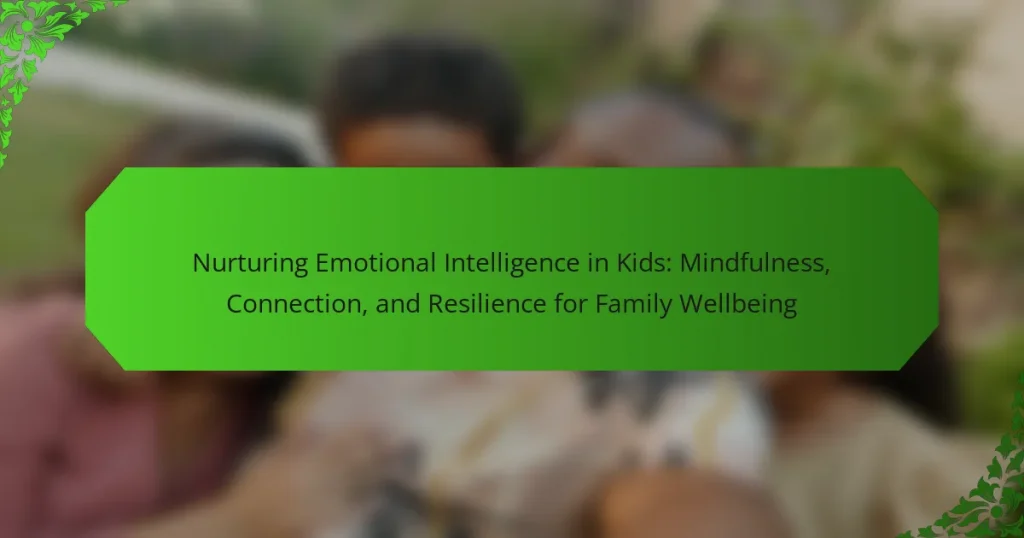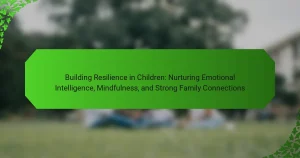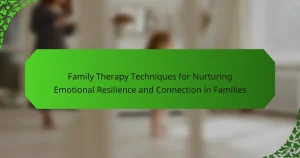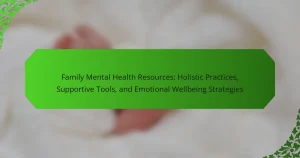Nurturing emotional intelligence in kids is essential for fostering mindfulness, connection, and resilience, which ultimately enhances family wellbeing. This article explores how mindfulness practices promote self-awareness and empathy, strategies to build strong family connections, and the importance of resilience in overcoming challenges. Understanding these elements equips children with vital skills for healthy social interactions and academic success.
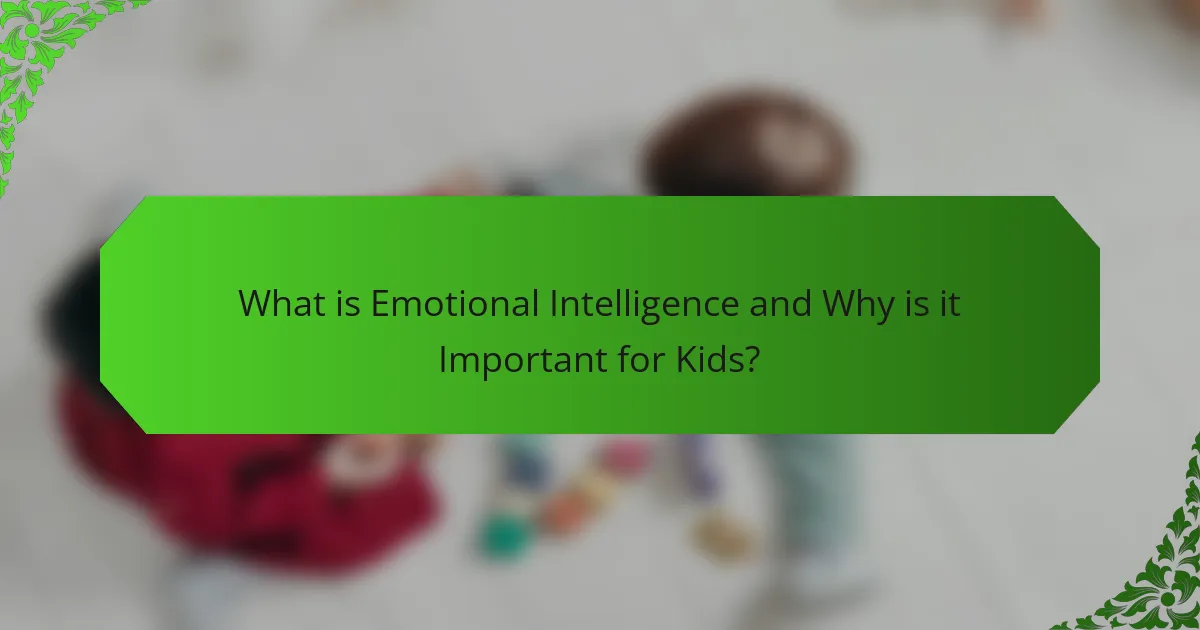
What is Emotional Intelligence and Why is it Important for Kids?
Emotional intelligence is crucial for kids as it fosters mindfulness, connection, and resilience. These skills enhance family wellbeing and promote healthy social interactions. Children with high emotional intelligence can better manage stress, empathise with others, and navigate challenges effectively. Research indicates that emotional intelligence contributes to academic success and positive relationships, making it an essential aspect of child development. Nurturing these qualities early on equips kids with the tools to thrive in various life situations.
How does Emotional Intelligence Impact Family Wellbeing?
Emotional intelligence significantly enhances family wellbeing by fostering communication, empathy, and conflict resolution. It nurtures resilience in children, promoting mindfulness and connection within the family unit. Research indicates that families with high emotional intelligence experience stronger bonds and better overall mental health. Developing these skills in children leads to improved social interactions and emotional regulation, essential for a harmonious family environment.
What are the Key Components of Emotional Intelligence in Children?
Emotional intelligence in children comprises self-awareness, self-regulation, empathy, social skills, and motivation. These components foster resilience and connection within families. Self-awareness helps children recognise their emotions, while self-regulation enables them to manage reactions. Empathy allows understanding others’ feelings, enhancing social skills that promote healthy relationships. Motivation drives children to pursue goals, contributing to overall wellbeing. Nurturing these attributes through mindfulness practices strengthens emotional intelligence, benefiting family dynamics.
How do Emotions Influence Behaviour in Kids?
Emotions significantly influence behaviour in kids by shaping their responses and interactions. Understanding this connection is vital for nurturing emotional intelligence.
When children experience emotions like joy, sadness, or anger, they exhibit corresponding behaviours. For example, a child feeling happy may engage in play, while one feeling sad might withdraw. This behaviour reflects their emotional state and affects family dynamics.
Mindfulness practices help children identify and manage their emotions. Techniques such as deep breathing and reflection foster emotional awareness. As a result, kids develop resilience, enabling them to cope with challenges effectively.
Connection with caregivers enhances emotional regulation. Supportive relationships provide a safe space for children to express feelings. This connection reinforces trust and encourages open communication, essential for emotional growth.
What Role does Empathy Play in Emotional Development?
Empathy is crucial for emotional development as it fosters connection and understanding in children. It enhances emotional intelligence by enabling kids to recognise and respond to the feelings of others. This ability cultivates resilience, as empathetic children are more likely to form supportive relationships, reducing feelings of isolation. Research shows that empathy training can improve social skills and emotional regulation, promoting overall family wellbeing. Encouraging empathy at home can involve modelling compassionate behaviour and engaging in discussions about feelings, which strengthens emotional bonds within the family.
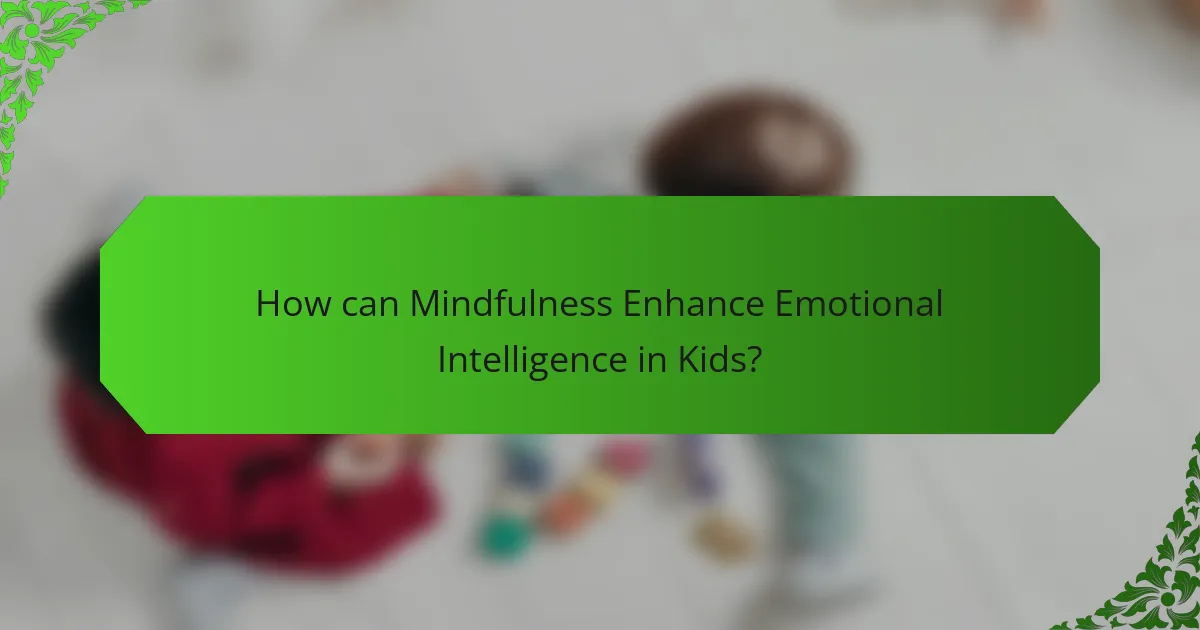
How can Mindfulness Enhance Emotional Intelligence in Kids?
Mindfulness can significantly enhance emotional intelligence in kids by fostering self-awareness and empathy. Practising mindfulness helps children recognise their emotions and understand others’ feelings, promoting healthier relationships. Research indicates that children engaged in mindfulness activities show improved emotional regulation, which is crucial for resilience. Regular mindfulness exercises, such as deep breathing and meditation, can be integrated into family routines, enhancing overall family wellbeing.
What Mindfulness Practices are Effective for Children?
Mindfulness practices effective for children include deep breathing, guided imagery, and mindful movement. These techniques nurture emotional intelligence by promoting self-awareness and emotional regulation. Deep breathing exercises help children calm their minds and bodies, while guided imagery encourages positive visualisation. Mindful movement, such as yoga, enhances focus and resilience. Engaging in these practices regularly can significantly improve family wellbeing and strengthen connections among family members.
How can Parents Introduce Mindfulness Activities?
Parents can introduce mindfulness activities by incorporating simple practices into daily routines. Start with short breathing exercises, encouraging children to focus on their breath for a few minutes. Use guided imagery by asking kids to visualise a calm place, enhancing their ability to relax. Engage in mindful walking, where families notice their surroundings together, fostering connection and awareness. Finally, create a gratitude journal, prompting children to reflect on positive experiences, which builds emotional intelligence and resilience.
What are the Benefits of Mindfulness for Family Dynamics?
Mindfulness enhances family dynamics by fostering emotional intelligence, connection, and resilience. It encourages open communication, reduces stress, and promotes empathy among family members. As a result, families experience improved relationships and a supportive environment. Research shows that practising mindfulness can lead to a 30% increase in emotional regulation in children, enhancing their ability to navigate social situations effectively.
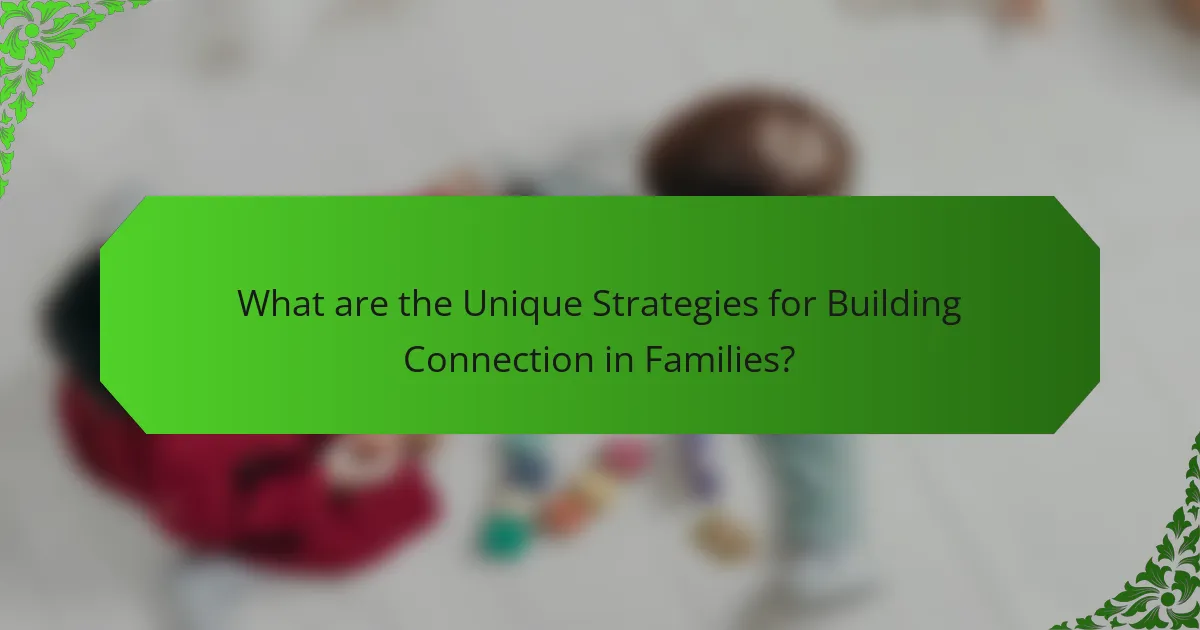
What are the Unique Strategies for Building Connection in Families?
Building connection in families involves unique strategies that nurture emotional intelligence. These strategies include fostering mindfulness, encouraging open communication, and promoting shared activities.
Mindfulness practices help children develop self-awareness and empathy, essential for emotional intelligence. Engaging in family discussions allows members to express feelings and thoughts, strengthening bonds. Shared activities, such as family game nights or outdoor adventures, create memorable experiences that enhance connection.
Implementing these strategies consistently contributes to resilience and overall family wellbeing. Prioritising emotional intelligence in children shapes their ability to form healthy relationships throughout life.
How can Quality Time Foster Emotional Bonds?
Quality time fosters emotional bonds by enhancing connection and understanding among family members. Engaging in shared activities promotes mindfulness, allowing children to express emotions freely. This interaction builds resilience, as children learn to navigate feelings together. Studies show that families who prioritise quality time report stronger emotional intelligence in children, leading to healthier relationships.
What Activities Promote Connection among Family Members?
Engaging in activities that foster connection among family members enhances emotional intelligence and resilience. Shared experiences like family game nights, cooking together, or nature walks promote bonding and communication. These activities encourage mindfulness, allowing family members to express feelings and thoughts openly. As a result, they cultivate a supportive environment essential for family wellbeing.
What Communication Techniques Support Emotional Intelligence?
Active listening, empathy, and open-ended questioning are key communication techniques that support emotional intelligence. These techniques foster understanding and connection in family interactions, enhancing emotional awareness and resilience in kids. Active listening involves fully concentrating on the speaker, which validates their feelings. Empathy allows caregivers to recognise and respond to children’s emotions, promoting a supportive environment. Open-ended questions encourage kids to express themselves, facilitating deeper conversations and emotional growth. Implementing these techniques nurtures emotional intelligence, leading to improved family wellbeing.
How can Parents Encourage Open Discussions about Feelings?
Parents can encourage open discussions about feelings by creating a safe and supportive environment. This involves actively listening, validating emotions, and modelling emotional expression. Engaging in regular family check-ins fosters connection and resilience. Incorporating mindfulness practices can enhance emotional awareness, allowing children to articulate their feelings more effectively.
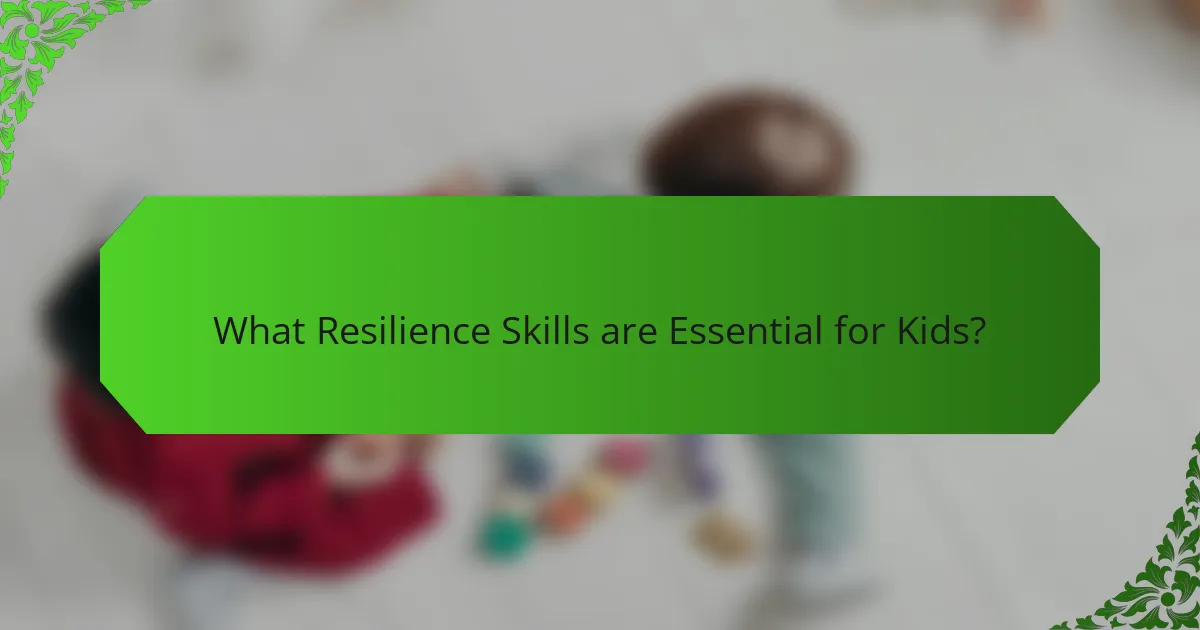
What Resilience Skills are Essential for Kids?
Emotional intelligence skills essential for kids include self-awareness, empathy, and effective communication. These skills foster resilience and enhance family wellbeing.
1. Self-awareness: Understanding emotions helps children manage stress and build confidence.
2. Empathy: Recognising others’ feelings promotes social connections and supportive relationships.
3. Effective communication: Articulating thoughts and feelings encourages healthy expression and conflict resolution.
4. Problem-solving: Developing strategies to overcome challenges strengthens resilience.
5. Mindfulness: Practising mindfulness techniques enhances emotional regulation and focus.
How can Resilience be Cultivated in Children?
Resilience in children can be cultivated through emotional intelligence, mindfulness practices, and strong family connections. Encouraging open communication allows children to express feelings, fostering emotional awareness. Mindfulness techniques, such as deep breathing and meditation, help children manage stress and develop self-regulation skills. Engaging in family activities strengthens bonds, providing a supportive environment that reinforces resilience. Research shows that children with higher emotional intelligence are better equipped to face challenges, leading to improved overall wellbeing.
What Role does Failure Play in Developing Resilience?
Failure is essential for developing resilience in children. It teaches them to cope with challenges and fosters emotional intelligence. Experiencing setbacks allows kids to learn problem-solving skills and enhances their ability to adapt. As a result, they build a strong foundation for future challenges, promoting overall family wellbeing. Encouraging mindfulness during these experiences helps children process emotions and strengthen connections within the family.
How can Parents Model Resilience for Their Kids?
Parents can model resilience by demonstrating emotional regulation and problem-solving skills. They should practise mindfulness, showing how to stay present during challenges. Engaging in open discussions about feelings fosters connection and teaches kids to express themselves. Consistent support and encouragement help children navigate difficulties, reinforcing their ability to bounce back.
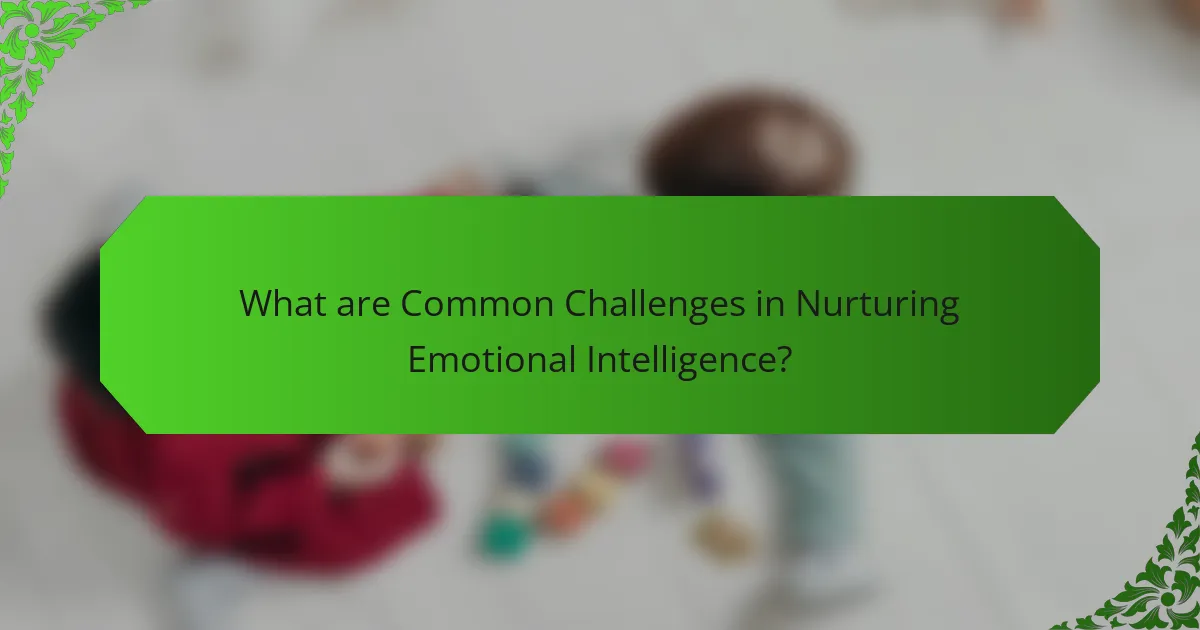
What are Common Challenges in Nurturing Emotional Intelligence?
Common challenges in nurturing emotional intelligence include lack of awareness, inconsistent practices, and external stressors. Parents may struggle to model emotional regulation effectively. Additionally, children’s varying developmental stages can complicate emotional learning. Limited time for mindfulness activities can hinder connection and resilience.
How can Parents Overcome Barriers to Emotional Development?
Parents can overcome barriers to emotional development by fostering mindfulness, enhancing connection, and building resilience. Mindfulness practices, such as meditation, help children recognise and regulate their emotions. Strengthening family connections through open communication creates a supportive environment for emotional growth. Additionally, teaching resilience equips children to handle challenges, promoting long-term emotional intelligence.
What Mistakes Should Parents Avoid in Emotional Education?
Parents should avoid dismissing emotions, overemphasising achievement, and neglecting open communication. Recognising and validating children’s feelings fosters emotional intelligence. Encouraging resilience without pressure helps develop coping strategies. Prioritising mindfulness practices enhances family connections, promoting well-being.
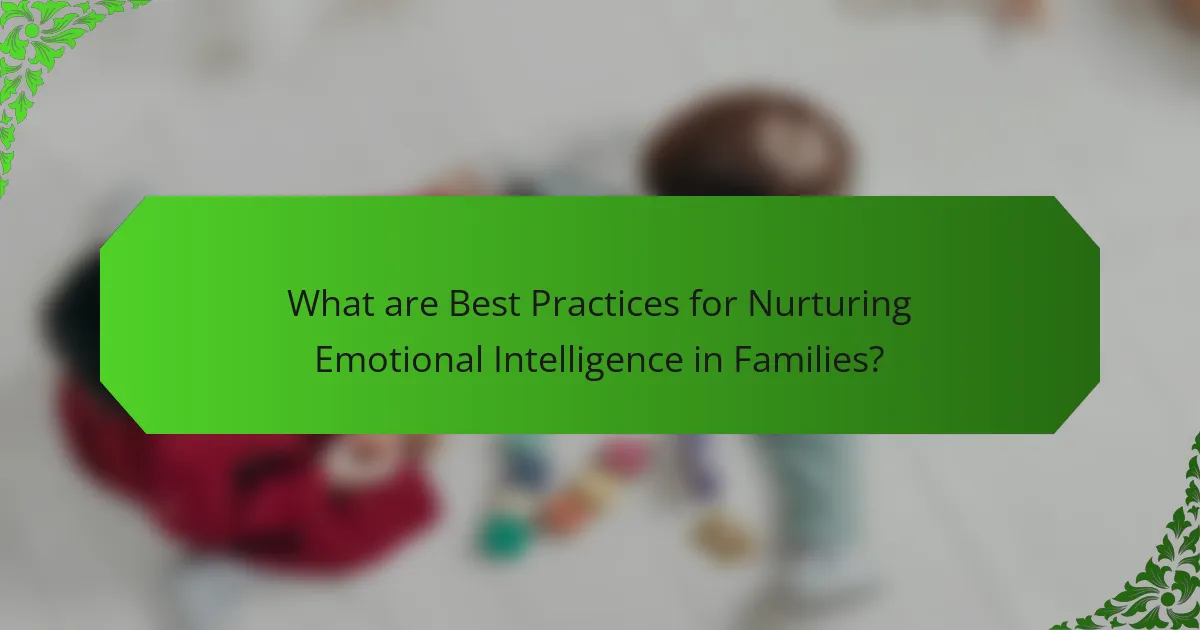
What are Best Practices for Nurturing Emotional Intelligence in Families?
To nurture emotional intelligence in families, prioritise mindfulness, connection, and resilience. Mindfulness practices, such as meditation, enhance self-awareness and emotional regulation in children. Fostering connection through open communication strengthens family bonds and encourages empathy. Building resilience equips kids to face challenges, promoting a positive mindset. Implementing these strategies consistently leads to improved emotional wellbeing for the entire family.
How can Families Create an Emotionally Supportive Environment?
Families can create an emotionally supportive environment by fostering open communication, encouraging mindfulness practices, and building strong connections. Prioritising emotional intelligence in children enhances resilience and overall family wellbeing. Regular family discussions about feelings promote understanding and empathy. Mindfulness activities, such as meditation or deep breathing, help children manage stress. Engaging in shared experiences strengthens bonds and nurtures a sense of belonging. These practices cultivate a foundation for emotional support, enabling families to navigate challenges together.
What Resources are Available for Parents Seeking Guidance?
Parents seeking guidance on nurturing emotional intelligence in kids can access various resources. Online platforms offer articles, webinars, and courses focused on mindfulness, connection, and resilience. Local community centres often provide workshops and support groups. Books authored by experts in child psychology and emotional development serve as valuable references. Additionally, parenting apps can deliver daily tips and exercises to foster emotional skills.
How can Families Measure Progress in Emotional Development?
Families can measure progress in emotional development by observing behavioural changes, emotional expression, and social interactions. Regular check-ins through discussions can provide insights into children’s feelings and coping strategies. Tracking these aspects over time helps identify growth in emotional intelligence. Utilizing tools like journals or emotion charts can further facilitate this process.
